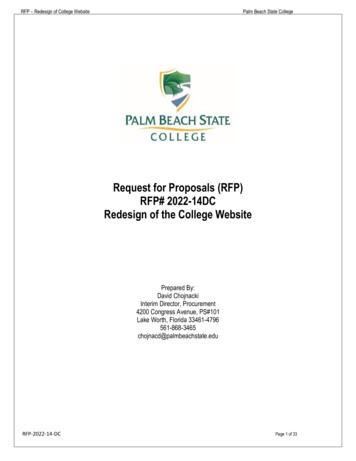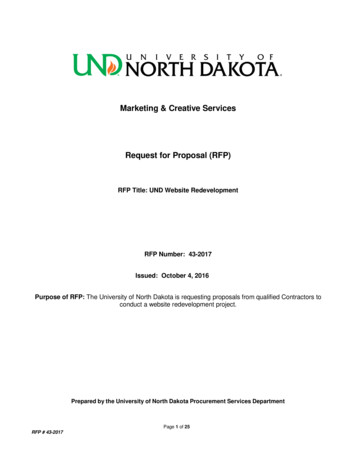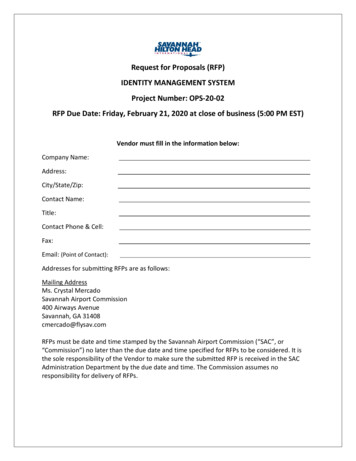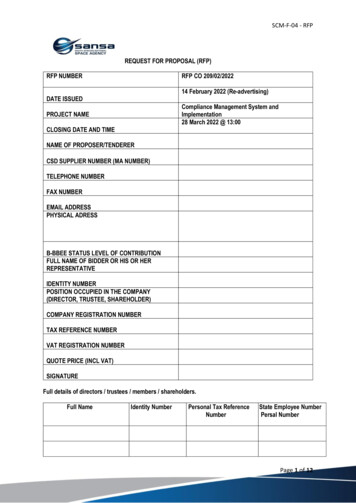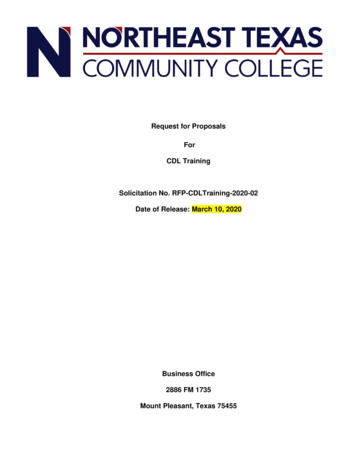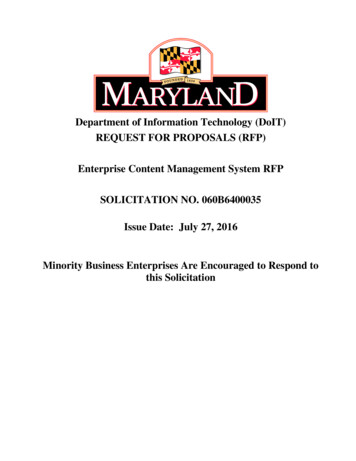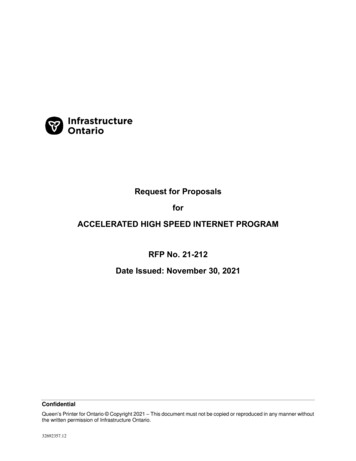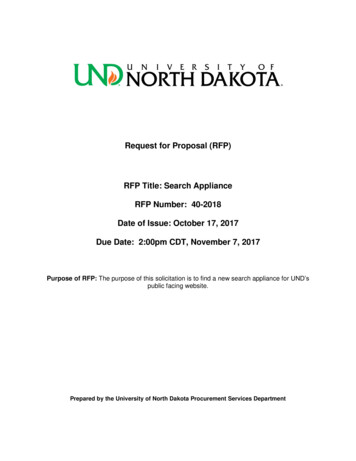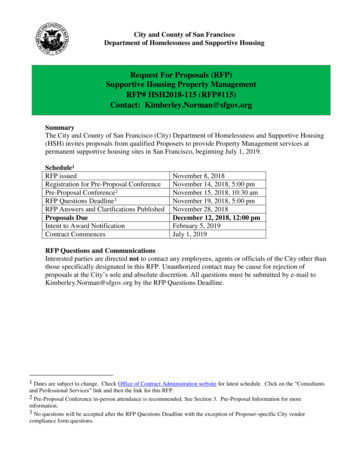
Transcription
Request for Proposals (RFP)ToFromSubjectRFP Issue DateRFP Closing DateRFP Closing TimePerformance Period: Offerors: Global Partnership for Sustainable Development Data (GPSDD)/United Nations Foundation (UNF): Compendium of good practices and lessons learned in linkingCivil Registration and Vital Statistics (CRVS) systems to identity managementsystems: January 2, 2019: January 21, 2019: 17:00 hours U.S. Eastern Time.: Approximately March 1 to June 30, 2019GPSDD is seeking consultants/consulting firm with considerable experience and knowledge of civilregistration and vital statistics (CRVS) systems and the identity ecosystem to develop country case studieson the good practices and lessons learned in linking CRVS systems and identity management systems.GPSDD invites qualified individuals, firms, and organizations (“Offerors”) to submit a proposal for therequested services. The Contract resulting from this award will be a Consultant Agreement.Offerors are encouraged to read this RFP in its entirety, paying specific attention to the scope of services,instructions, and requirements. Issuance of this solicitation does not, in any way, obligate UNF to awarda contract, nor will UNF pay for any costs incurred in the preparation and submission of a proposal. Theagreement resulting from this RFP will be provided to the most responsive Offeror whose offer will be themost advantageous to GPSDD/UNF in terms of cost, functionality, and other factors as specified in thisRFP.Section 1: Background and PurposeBackground: United Nations FoundationThe United Nations Foundation links the UN’s work with others around the world, mobilizing the energyand expertise of business and non-governmental organizations to help the UN tackle issues includingclimate change, data, global health, peace and security, women's empowerment, poverty eradication,energy access, and U.S.-UN relations. The United Nations Foundation hosts and provides administrative,financial and contractual services for GPSDD. For more information, visit www.unfoundation.org.
Background: Global Partnership for Sustainable Development DataThe Global Partnership for Sustainable Development Data is a fast-growing, dynamic internationalpartnership bringing together over 320 different organizations including governments, UN agencies,private companies, civil society organizations, and many others. GPSDD convenes, connects and catalyzesaction to address the problems of poor data use, access, quality and production, and to work withstakeholders to fully harness the new opportunities of the data revolution in the service of sustainabledevelopment. GPSDD aims to link and align action, capacities and resources across geographies, sectorsand data communities. For more information, please visit http://www.data4sdgs.org.Background: Foundational Systems to Leave No One Behind (LNOB)As the world strives to meet the Sustainable Development Goals (SDGs), there are fundamental challengesthat need to be overcome in order to leave no one behind. Goal 16, Target 16.9 makes the commitmentthat by 2030 (countries will) provide legal identity for all including free birth registrations. 1The latestWorld Bank data estimates that 1 billion people cannot legally prove who they are due to lack ofrecognized identity documentation (ID). This means that country Civil Registration and Vital Statistics(CRVS) 2systems, which ought to capture data on key vital events including births and deaths, are notworking adequately.The identity ecosystem in each country can be quite complex as it involves numerous government andnon-government providers, users and enablers of identity assets, systems and registers. These systemshave often been developed in isolation because they are driven by different actors with various politicaland development objectives. In countries with weak CRVS systems and particularly low levels of birth anddeath registration, the failure to ensure well-functioning civil registration and integrate it with other IDsystems has led to numerous problems, including perpetuating exclusion of certain population groups,incomplete and unreliable population registers which limit governments’ ability to use the data forplanning and service delivery, and public resource wastage from investments in systems that are not wellused beyond a single event like an election cycle.While this is starting to change, the legacy of these systems and the perspectives of the institutions thatsupport them often perpetuate a siloed approach. There is a fairly widespread consensus among technicalspecialists on the need to strengthen the links between CRVS and ID systems. Yet there is limited evidencedocumenting lessons from successful cooperation/integration between CRVS and ID systems, and littlereflection on the lessons learned in cases where information sharing between these systems has not beensuccessful.With funding from the IDRC Centre of Excellence on CRVS systems, GPSDD will aim to: Strengthen the evidence base on the successful cooperation/integration between CRVS and IDsystems by producing country case studies and a synthesis report;Disseminate the evidence in a number of global, regional and country level events to: build momentum on the importance of addressing these two systems as one and thebenefits it brings, particularly to policy makers. Increase more awareness to non-technical audiences and hence promote learningMeasured by the percentage of children under the age of 5 years whose births are registered by a civil authority.This is the systematic reporting and registration of vital and civil events—including birth, death (and causes of death), adoption, marriage, anddivorce. CRVS forms the foundational collection of information about people through their lifetime.12
This RFP outlines the scope of work for consultants/consulting firms to support this effort by developingcountry case studies on the successful integration of CRVS and ID systems. The aim of this work is todevelop a compendium of good practices and lessons learned in linking CRVS systems and identitymanagement systems.GPSDD plans to produce between 6 and 8 country case studies in the period of this project. The work willhave a lead researcher who will provide direction and guidance to all case study authors. An AdvisoryGroup consisting of renowned experts in the CRVS and ID field will provide additional guidance and peerreview of the work. Through this RFP, GPSDD seeks authors for 3 case studies in: Rwanda, Namibia andChile.Section 2: Scope of ServicesThe consultant/consulting firm will be required to undertake research and analysis to:1. With support from GPSDD, IDRC and other partners, build a relationship with the responsiblegovernment authorities of the case study country before the start of the work in order to ensurebuy-in and uptake of work.2. Carry out field work in the case study country, ensuring a mix of respondents are interviewed.The methodology for this work will be designed by the lead researcher, but case study authorswill be invited to provide input.3. Conduct desk research to effectively verify and capture the lessons learned.4. Work with the GPSDD secretariat, Advisory Group, lead researcher, IDRC and other partners inthe network and beyond to identify, verify and iterate on the case studies.We anticipate that each case study will take approximately 15 days to complete, including 5 days incountry. Each case study author will also be expected to attend an in-person meeting with the AdvisoryGroup and other case study authors in Washington DC/ New York. The Offeror should include 2 days intheir budget for this meeting.While we welcome all interested applicants, we highly encourage Latin America basedconsultants/consulting firms for the Chile case study, and Africa based consultants/consulting firms forthe Rwanda and Namibia case studies. Applicants can opt to bid for only one case study, althoughpreference will be giving to applicants who bid to complete both African case studies.Qualifications(If a consulting firm is bidding, GPSDD would look for these qualifications from the lead individual andothers likely to be significantly engaged in the work.) Master's degree in public policy, international development, or other relevant field, plus 5-10years of relevant experience; or an equivalent combination of education and experience.Communications experience is also an asset.Experience conducting research and assessing case studies across countries and sectors inparticular on CRVS and ID systems;Exposure to foundational population systems and the LNOB agenda;
Demonstrated knowledge of data for sustainable development challenges;Conversant in policy discourse on the Sustainable Development Goals, the data revolution, CRVSand ID systems;Strong strategic thinker with the ability to identify lessons (both successes and failures) todevelop a compelling case study;Excellent writing, editing, interpersonal, and oral communications skills.Working knowledge of the language spoken in the case study country of focus.Deliverables Iterate the case study with GPSDD secretariat, lead researcher and Advisory Group; Present the case study findings to the Advisory Group in a peer review meeting, and make thenecessary changes to the case study. Final country case study; Where necessary, support the dissemination of the findings.Section 3: RFP ConditionsUNF reserves the right to: Reject any or all offers and discontinue this RFP process without obligation or liability to anypotential Offeror or other party.Accept other than the lowest price offered.Award a contract on the basis of initial offers received, without discussions or requests for best andfinal offers.Award more than one contract.Nothing in this RFP is, or should be relied on by Offeror as a promise or representation by UNF. UNF doesnot make any representation or warranty as to the completeness of this RFP or have any liability for anyrepresentations (express or implied) contained in, or omissions from, this RFP. This RFP and any replies toany written notifications are transmitted to the Offeror solely for the purposes of the Offeror preparingand submitting a Proposal. Each Offeror shall keep the RFP and its contents confidential.Any information or materials submitted in response to this RFP and/or as a proposal (whether successfulor unsuccessful) shall become the property of UNF and will not be returned. In submitting a proposal, theOfferor must agree that the offer shall remain firm for a period of no less than 120 days from the RFPclosing date. Failure to follow the specifications and requirements provided in this RFP may result indisqualification.Section 4: Proposal Preparation InstructionsProposals are expected to be comprehensive and include the information set forth below.1. Cover LetterA one (1) page cover letter on the Offeror’s letterhead should be submitted and should include thefollowing:
a. A reference to the RFP subject.b. The primary contact person with respect to this RFP: the individual’s name, address,phone number and email address.c. A statement confirming the Offeror does not have a conflict of interest with this RFP, real orperceived.d. Signature of the person(s) duly authorized to sign on behalf of the Offeror and bind the Offerorto statements made in response to the RFP.2. Proposal Narrative, no more than 6 pagesThe proposal narrative will include: A brief description of the Offeror’s understanding of the scope of services and proposedmethodology for the work A brief description of the Offeror’s experience and expertise in the field that illustratesoverall qualifications and capabilities to meet the terms of the RFP3. Resume or CV of individual or principals, in the case of consulting firm.4. List of Past and Current Clients5. Cost RequirementsThe Offeror should state the costs required, on a daily basis, to meet the services outlined. All costsmust be in U.S. Dollars. Travel will be arranged separately and should not be included in the budget. Additionally, no costs related to dissemination work should be included in the budget.Costs related dissemination work will be negotiated with the successful Offeror at a laterdate.Proposal Submission: Proposals, including any attachments (limited to 6MB), should be sentelectronically in PDF format to: proposals@data4sdgs.org. Be sure to include in the subject line: CRVS/IDCountry Case Study Consultant. UNF will not accept proposals received by fax or mail.All proposals are due by the date and time stated above. Any proposal received after the required timeand date specified for receipt shall be considered late and non‐responsive. Late proposals will not beevaluated.Section 5: SelectionGPSDD will review candidates with the goal of selecting a consultant/consulting firm most advantageousto GPSDD, based on the qualifications listed above, as demonstrated by the resume or CV, proposalnarrative, and additional material, if applicable. GPSDD will consider the Offeror’s capability to deliver thescope of services, and the feasibility of the approach. GPSDD will also consider the overall costs to ensurethat they are reasonable to deliver the services. GPSDD may meet with one or more Offerors prior toselection.Section 6: Terms of Payment
Payment terms for the award shall be on a deliverables basis. Payment is dependent upon receipt of validinvoice, and contingent upon successful completion of deliverables and related activities, at the solediscretion of UNF. Payment shall be made in U.S. Dollars by the UNF via check or electronic fundstransfer/bank wire. The final payment terms in the contract will control, not this RFP. No advancepayments will be provided.
Civil Registration and Vital Statistics (CRVS) systems to identity management : Compendium of good practices and lessons learned in linking systems . RFP Issue Date : January 2, 2019 RFP Closing Date : January 21, 2019 RFP Closing Time : 17:00 hours U.S. Eastern Time. Performance Period : Approximately March 1 to June 30, 2019
